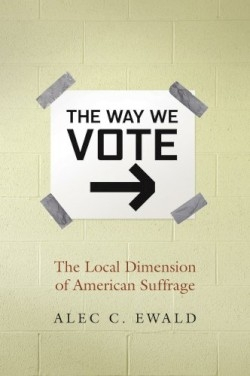The Way We Vote
The Local Dimension of American Suffrage
Within minutes of the polls closing, television reporters can tell us how many women, aged thirty-five to forty-two, in a specific county in New Jersey, voted for the Democrat for Congress and why. Alec C. Ewald, in The Way We Vote, on the other hand, tells us how we cast those ballots. Voting in America is a complex combination of federal, state and local laws, and administrative procedures. Ewald argues convincingly that this practice of three-tiered governance over our electoral practices is intentional and not the result of accident or neglect.
But Ewalds book is more than a treatise on voting practices. Equally important are the unanswered questions he raises. What does it mean to be self-governed? Why do we hold elections? Why should people want to participate in electoral politics? What effect will these elections have on federal, state, and local government policy?
The authors purpose in this book is twofold. He provides a historical explanation of why we have developed this largely locally administered voting practice with substantial variations. And he assesses the effect our voting practices have on popular sovereignty and the matter of exclusion. He accomplishes both goals and defends local administrators of voting practices in the face of reformers calling for more national uniformity and control.
Ewald details the American history of voting practices from colonial times when voting was often by voice, through the reforms of the nineteenth century and down to the more recent episodes of hanging chads and extraordinarily long lines. He specifies the various reforms that have shaped and broadened our voting system, including the adoption of a single day to vote for President and for members of Congress, the use of the “Australian ballot,” the abolition of property ownership tests, and the extension of the right to vote to African Americans and women.
According to Ewald, as a nation we are a work in progress. We are guided by our history, informed by our instincts, and nudged along by our institutions. If, as Henry Glassie stated, history is “a map of the past, drawn to be useful to the present traveler,” then Ewald has created a tool for all of us to more fully understand our civic duties.
Reviewed by
John Michael Senger
Disclosure: This article is not an endorsement, but a review. The publisher of this book provided free copies of the book to have their book reviewed by a professional reviewer. No fee was paid by the publisher for this review. Foreword Reviews only recommends books that we love. Foreword Magazine, Inc. is disclosing this in accordance with the Federal Trade Commission’s 16 CFR, Part 255.

